Coming from a renowned cybersecurity company, Avira Phantom VPN promises a lot to potential customers. From rock-solid security, bank-grade encryption, and a no-logs policy to the ability to unblock geo-restricted content and native apps for all major platforms.
While we discussed all of that in our Avira Phantom VPN review, in this article, we will perform security analysis. This means examining its security features, seeing how well they work, as well as checking its privacy policy to see if the provider has intrusive logging practices.
In the end, we’ll answer the question: is Avira Phantom VPN safe and secure? To do this, we will also perform some IP and DNS leak tests. All of these tests will give you a clear image of whether or not the provider is safe and secure, so if you’re thinking about buying it, I recommend reading this article first.
The results might surprise you, as Avira Phantom VPN isn’t exactly what it paints itself to be. Intrigued to hear more? As said – keep reading!
Is Avira Phantom VPN Safe to Use? Security Features Examined
To find out if Avira Phantom VPN is safe and secure, we need to talk about its security features first. I’ll be honest – there isn’t a whole lot of them and you don’t get any fancy functionalities found in providers like ExpressVPN or CyberGhost.
But, as always, let’s work with what we have here.
256-bit AES Encryption
And what do we have in terms of encryption? As you can guess, 256-bit AES encryption is used to protect your connection, which is the highest level of encryption you can get in a VPN service. This encryption is used even by much better providers, so we’re off to a good start.

Remember that 256-bit encryption is impenetrable even when talking about advanced hacking techniques or even brute force. Plus, it’s also used by the military and governments worldwide to secure important data, which speaks volumes about it.
Kill Switch
Another security feature we have is a kill switch. In the app, it’s not called that. It, instead, has a descriptive name that explains how the feature works. In other words, it shuts down your internet connection if you lose the connection to a VPN server.
This way, it preserves your IP address and prevents it from leaking to the public eye. While we’re at it, I should mention IP/DNS leak protection that Avira Phantom VPN offers, which we’ll test later in this analysis. For now, I should point out that the kill switch works well.
One time I encountered an error with the server and lost my connection, the kill switch sprung into action and disabled my internet connection – good job. Unfortunately, this provider has no split tunneling, albeit, you can check my article about VPNs with split tunneling if that’s an issue for you.
Block Malicious Sites and Content
Avira Phantom VPN has a feature called “Block malicious sites and content”. In theory, it sounds great, as you’ll be able to stay away from malicious content online and prevent unwanted malware infestations. In practice, this feature isn’t working as intended.
While using this VPN with the feature enabled, I noticed that I can still go to whichever site I wanted without any warnings or anything similar from the provider. Yet, I’m sure I visited a few “malicious” sites by visiting The Pirate Bay, adult sites, and other “suspicious” places on the internet.
I’m not sure if the feature is just a placeholder meant to trick you into thinking it really works. Or perhaps, it works for other people but not for me. Either way, I’m not impressed and I think Threat Protection from NordVPN does a much better job in this regard.
Support for OpenVPN & IPSec
Is Avira Phantom VPN safe and secure? To answer the question, we also must mention its protocols. Unfortunately, the service doesn’t support WireGuard, so you’re left with OpenVPN on Android/Windows and IPSec on iOS/macOS.
While OpenVPN is still relevant in 2025, IPSec isn’t very secure and doesn’t provide great performance. This makes Avira VPN a lot slower and less secure for people in Apple’s ecosystem. OpenVPN on Windows and Android is a bit better in terms of security.
However, it produces slow connection speeds compared to WireGuard, which sports amazing speeds and shortens the connection times significantly. That said, we’re not impressed with the roster of security features you get with this VPN. For the money, it must be a lot better.
Avira Phantom VPN: Analysis of Its Privacy Policy & Jurisdiction
The most interesting part of this analysis is this one. We’re going to talk about its jurisdiction and analyze its privacy policy in-depth to see just how safe and secure Avira Phantom VPN is.
Where Is Avira Phantom VPN Based?
First of all, Avira is a well-known company with headquarters in Germany. Germany is a country from the European Union and a part of the 14 Eyes alliance. 5 Eyes is the name of an alliance of 5 English-speaking countries: the US, the UK, Canada, Australia, and New Zealand.
The 14 Eyes is an extension of this alliance which includes Germany, France, Italy, and many other Western European countries. What do they have in common? Data-retention laws, global surveillance, and constant monitoring of their citizens.
Providers based in such countries can be forced to hand out user-related information to the authorities, which happened many times with providers like this. One example is HMA VPN which cooperated with the FBI and handed out the connection logs to help with a particular criminal case.
The same happened with IPVanish a few years ago and IPVanish is a US-based service. Why am I telling you all of this, you might be wondering. Well, I’m preparing you for what’s to come in the next section.
Is Avira Phantom VPN Safe in Terms of Logging Practices?
You see, Avira Phantom VPN claims to have a no-logging policy but that couldn’t be further from the truth. After a thorough examination of its privacy policy, I saw that the provider processes and stores quite a lot of user-related information which is quite alarming.
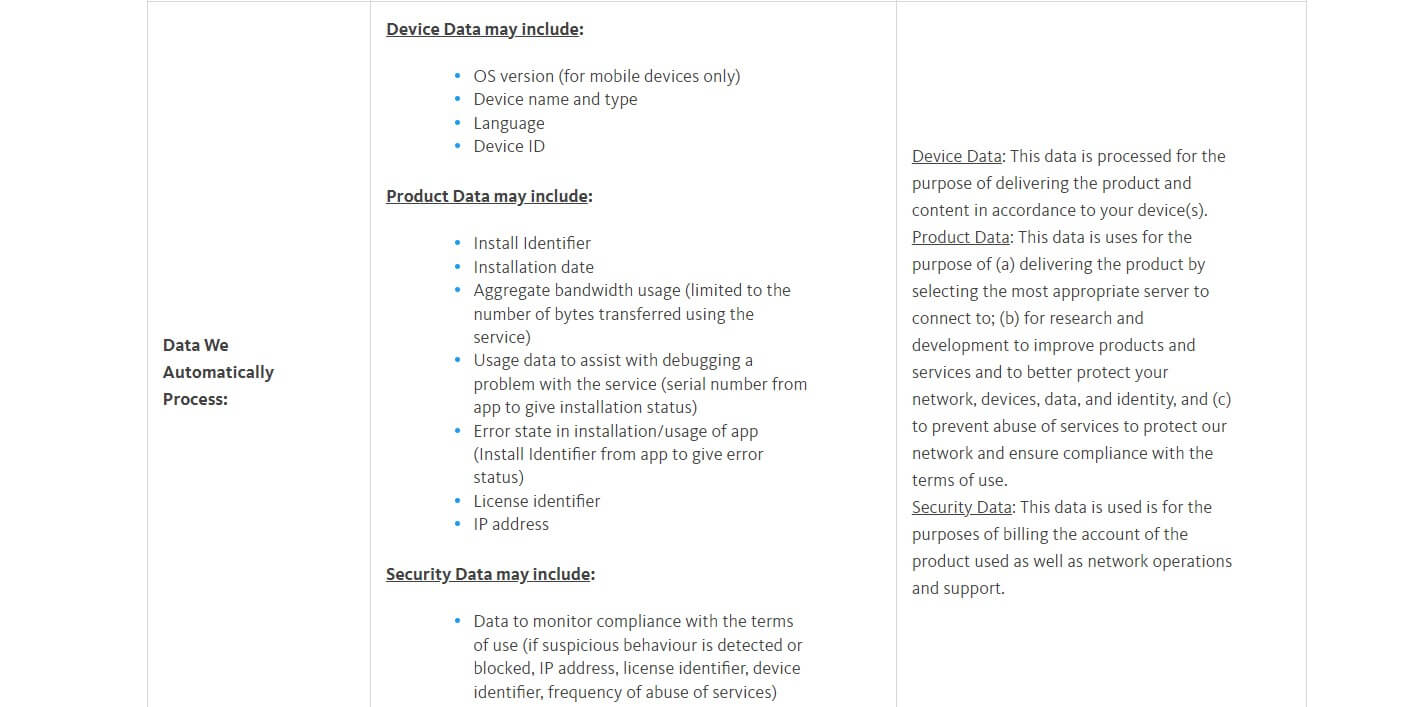
Here’s just a small cutout from the privacy policy on the site. As you can see, this data is automatically processed and it includes parameres like your OS version, language, device ID, and device name and type. This is called Device Data.
The most alarming, however, are the two next categories – Product Data and Security Data. In Product Data, you can find information like installation date, install identifier, aggregate bandwidth usage, a license identifier, and most alarming – IP address!
Yes, Avira Phantom VPN stores your IP address, which is a HUGE red flag for privacy. In addition, Security Data is here to, allegedly, prevent abuse of the VPN, for which reason the company must store all of the aforementioned information.
Of course, I think it’s a lie and Avira cleverly plays with words to make you think that storing this amount of information is benign. 5 Eyes countries use the same reason for their surveillance – to prevent terrorism. But how many people do you personally know are terrorists?
If you answered with zero, welcome to the club.
Avira Phantom VPN won’t store logs of your browsing history, however, as well as the services you use on the internet. But having in mind that it stores your IP address, it can easily track your activities too, so there’s no point in assuring you that your browsing activities are safe.
The final nail in the coffin is the lack of external, third-party audits, which is expected, as the company takes no special care of your privacy, which the privacy policy perfectly explains.
IP & DNS Leak Tests: Let’s See if There’re Any Leaks
Is Avira Phantom VPN safe and secure then? No, it’s not. But if you still want to use this provider and you’re interested in its shallow offerings, let’s perform a few IP/DNS leak tests to see if it’s at least capable of securing your connection properly.
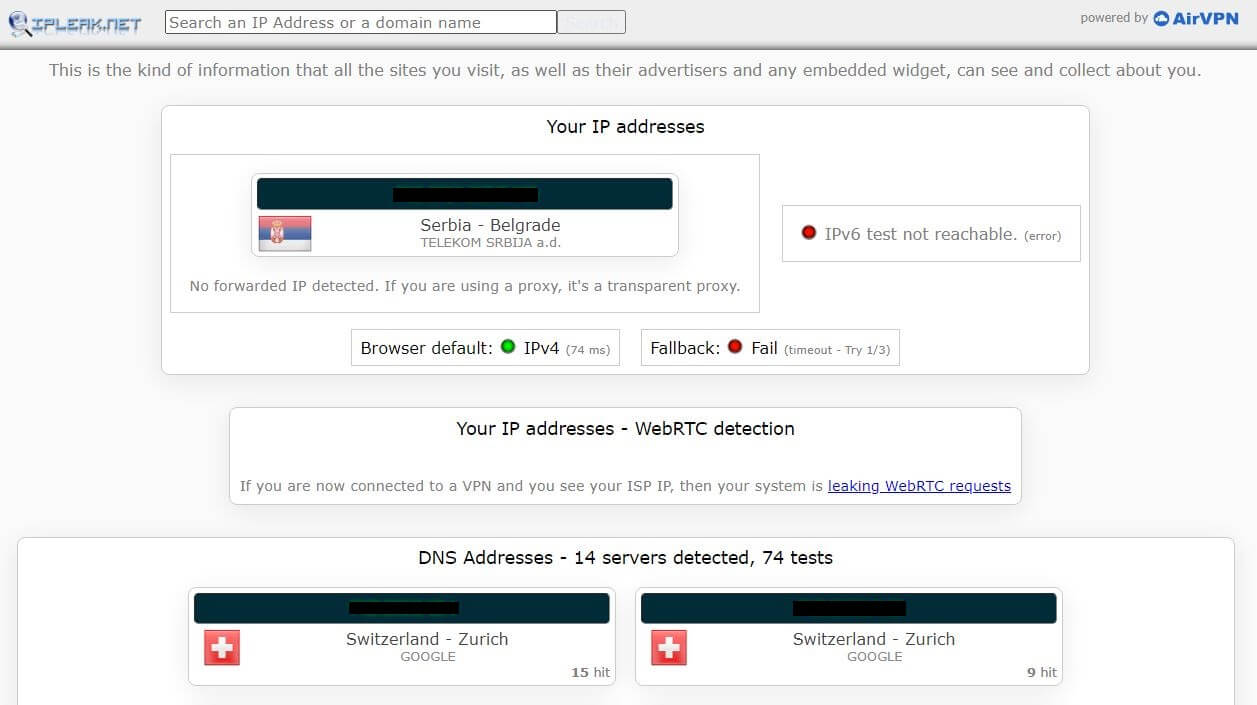
In the screenshot above, you see the test results I got on the website ipleak.net. This site lets you check for IP and DNS leaks and the results you see are with my native IP and DNS addresses while not using a VPN. Hence, IP/DNS addresses are masked for obvious reasons.
I tested Avira Phantom VPN using 3 server locations to see if it’ll leak my native IP and DNS addresses, starting with the US server.
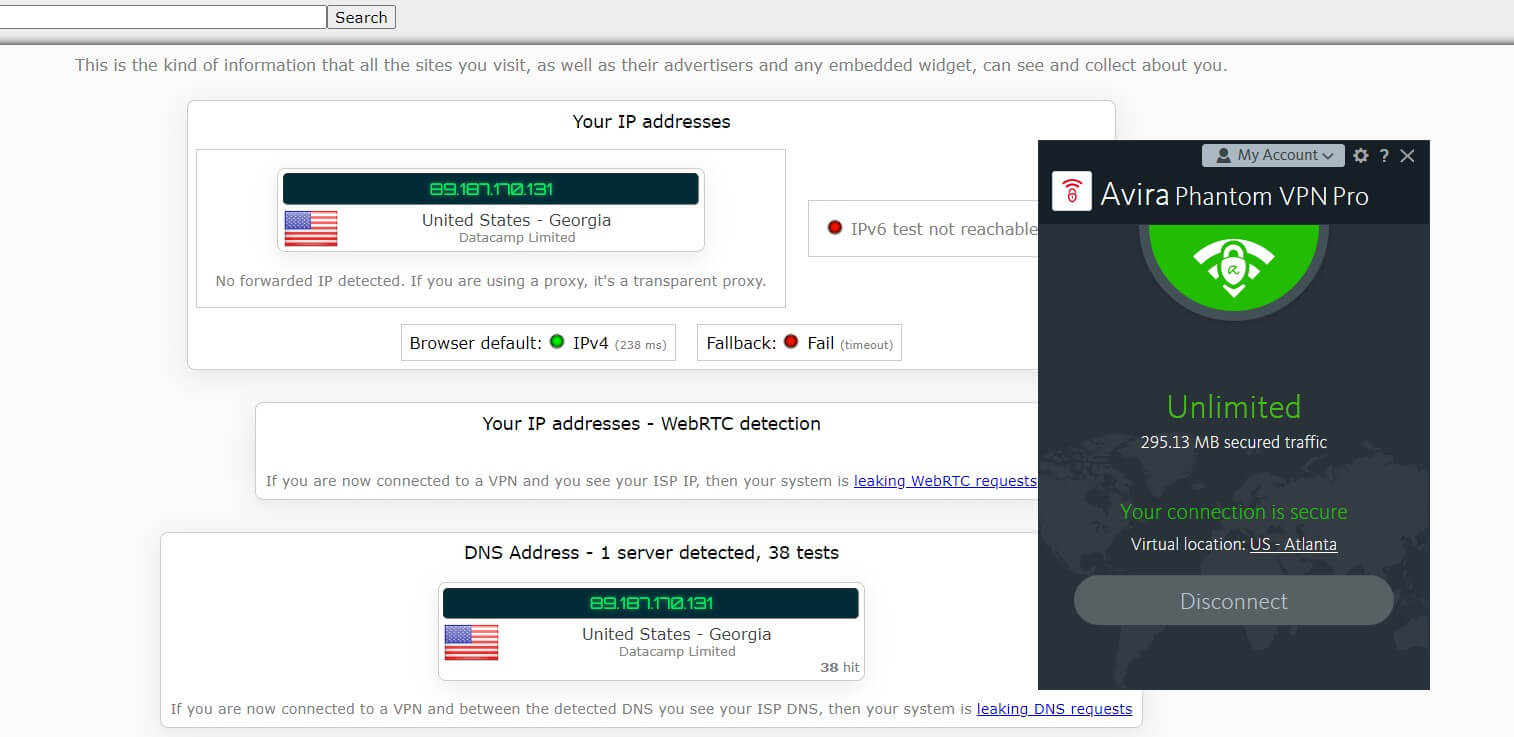
As you can see, the provider shows no leaks when using a server in the United States, which is a good start. If you need to get a VPN for the UK, Avira offers servers in this country. And the good thing is that they show no signs of leakage – good job.
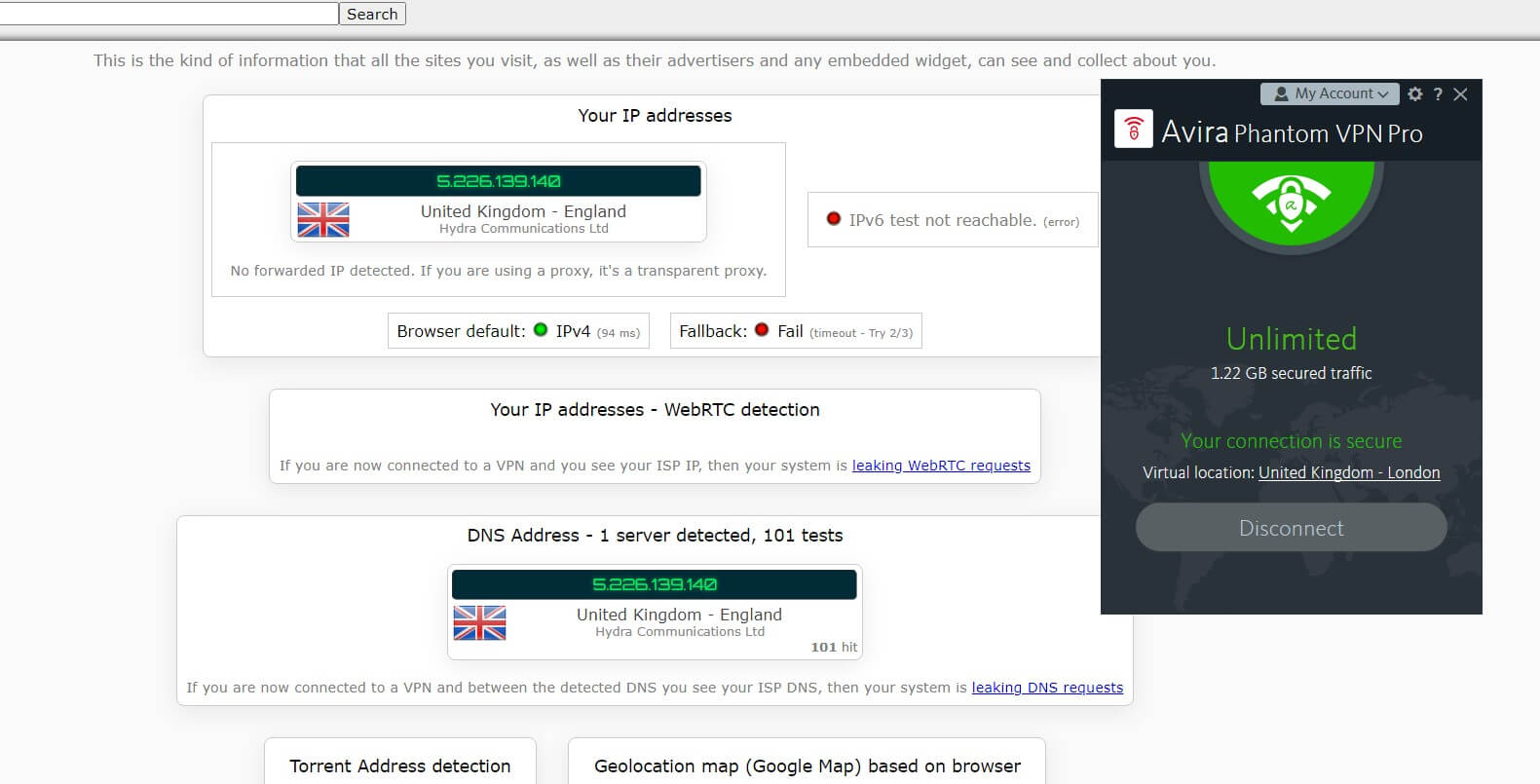
Finally, I tested the Japanese server. After connecting to this server, which took a while, I refreshed the ipleak.net page and got these results.
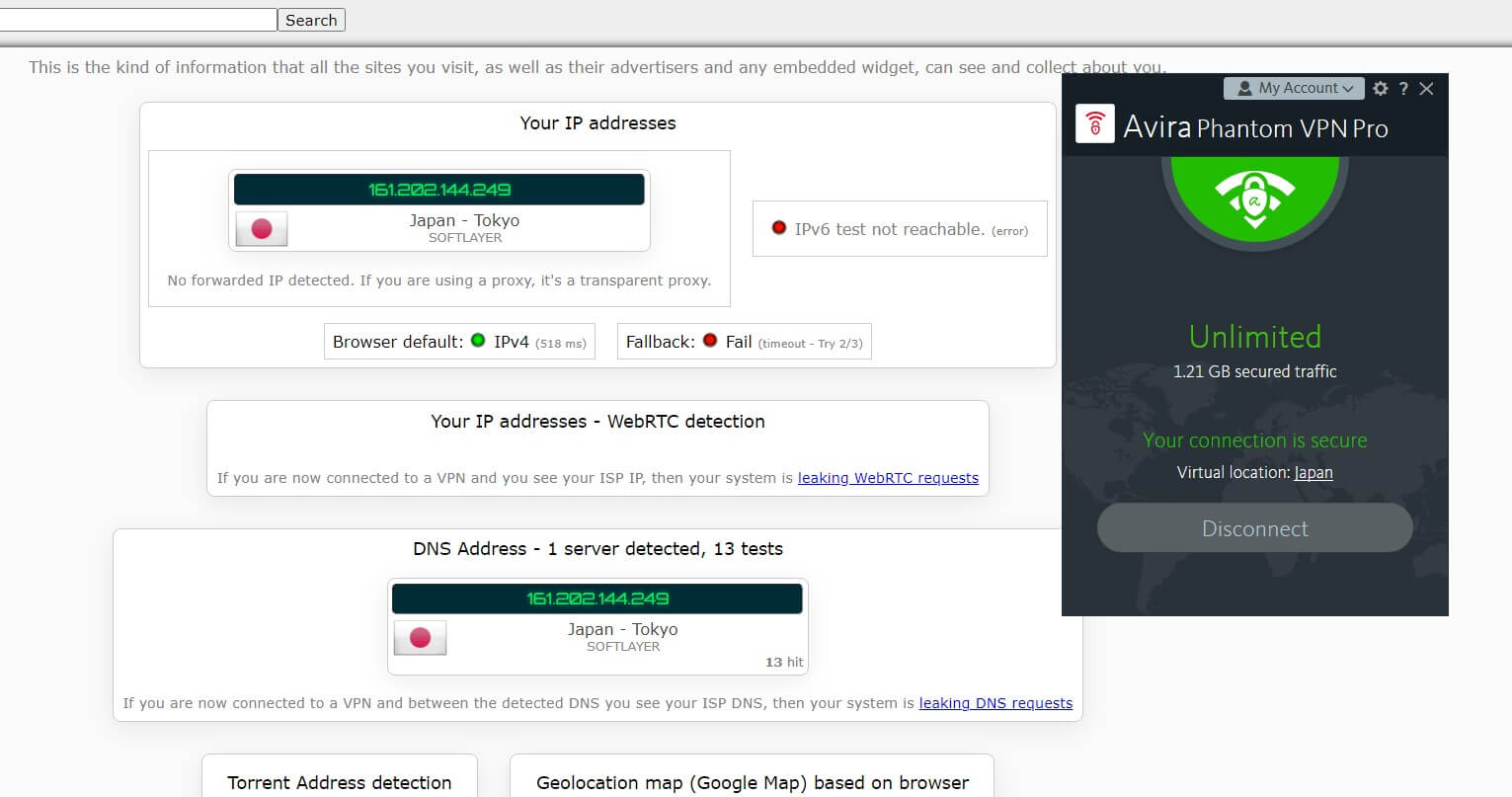
Once again, no leaks are present, which means that Avira Phantom VPN is capable of properly encrypting your connection and keeping your browsing activities anonymous.
So Is Avira Phantom VPN Safe to Use?
With all the tests out of the way, I think we have enough information to answer the question: is Avira Phantom VPN safe and secure? The answer, as you can guess, is NO. Sure, it shows no leaks and offers a few security features, but that’s not enough considering its intrusive logging practices.
Plus, some of its features don’t work that well and the provider offers outdated protocols like OpenVPN and IPSec, with no WireGuard support. Above all, I want to clarify that the provider stores your IP address, which is more than enough for me to stay away from it.
If we add its German (14 Eyes) jurisdiction to the equation, we get a perfect recipe for disaster which this VPN ultimately is. Once again, our full review will tell you everything about it, in which you’ll see that the lack of security and privacy isn’t the only problem – it’s just a small part of the entire package.
So, if you want a safe and secure VPN that fixes all of these issues and is better in terms of security features, what are your choices?
In that case, I recommend using ExpressVPN, CyberGhost, or NordVPN. We talked many times about these VPNs, so let’s not repeat ourselves.
Not only are they 100% no-log VPNs that take utmost care of your privacy but they’re also better in terms of performance, protocols, streaming, bypassing censorship, and everything else. And you know what? They’re either priced similarly or cheaper, which makes getting Avira VPN pointless.